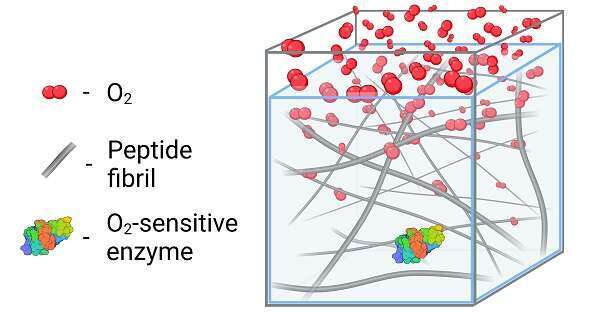
Protection of Oxygen Sensitive Enzymes by Peptide Hydrogel
2The Center for Nanoscience and Nanotechnology, Tel Aviv University, Israel
3The Center for the Physics and Chemistry of Living Systems, Tel Aviv University, Israel
4School of Plant Sciences and Food Security, The George S. Wise Faculty of Life Sciences, Tel Aviv University, Israel
5Artie McFerrin Department of Chemical Engineering. Department of Materials Science and Engineering, Texas A&M University, USA
6The Department of Molecular and Computational Biosciences and Biotechnology, Migal - Galilee Research Institute, Israel
Molecular oxygen (O2) is a highly reactive oxidizing agent and is harmful to many biological and industrial systems. Although O2 often interacts via metals or reducing agents, a binding mechanism involving an organic supramolecular structure has not been described to date. In this work, the prominent dipeptide hydrogelator Fluorenylmethyloxycarbonyl-diphenylalanine, is shown to encage O2, and significantly limit its diffusion and penetration through the hydrogel. Molecular dynamics simulations suggested that the O2 binding mechanism is governed by pockets formed between the aromatic rings in the supramolecular structure of the gel, which bind O2 through hydrophobic interactions. This phenomenon is harnessed to maintain the activity of the O2-hypersensitive-enzyme [FeFe]-hydrogenase, which holds promising potential for utilizing hydrogen gas for sustainable energy applications. Hydrogenase encapsulation within the gel, allows hydrogen production following exposure to ambient O2. This phenomenon may lead to utilization of this low molecular weight gelator in a wide range of O2 sensitive applications.
Ben-Zvi, O.*, Grinberg, I.*, Orr, A. A., Noy, D., Tamamis, P., Yacoby, I., & Adler-Abramovich, L. (2021). Protection of Oxygen-Sensitive Enzymes by Peptide Hydrogel. ACS nano, 15(4), 6530-6539.
